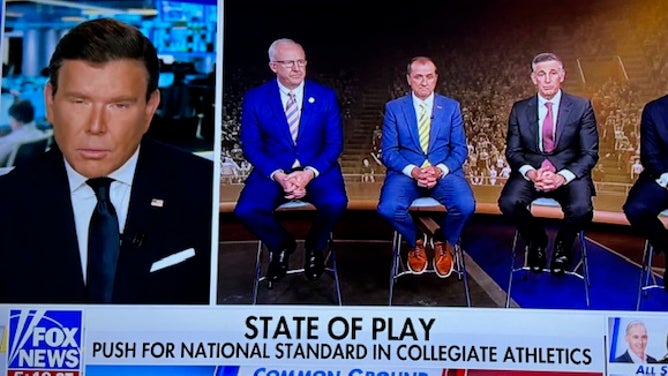Conference Commissioners Make Their Case With Bret Baier On Why Congress Is Needed To Regulate NIL In New Era
As the conversation continues around the upcoming ‘House’ settlement that will change the future of college athletics, commissioners from the SEC, Big Ten, Big 12 and ACC sat down for an interview on Thursday evening with host Bret Baier on Fox News Channel's Special Report.

Commissioners from the SEC, Big Ten, ACC and Big 12 joined FOX News host Bret Baier to discuss the current situation around NIL. Via: FOX News
While college leaders wait for a judge in California to approve changes to the upcoming settlement, athletic directors and commissioners descended upon Washington on Wednesday for a meeting of the minds, with lobbying Congress as part of the agenda.
The main talking point centered around the potential for federal guidelines pertaining to NIL, as we inch closer to revenue-sharing within collegiate sports.
While arguing over whether the ‘Wild Wild West’ will continue throughout the conversation about NIL and the upcoming settlement, leaders of the biggest conferences on college sports are trying their hardest to have Congress finally step in.
Speaking with Bret Baier, the SEC's Greg Sankey, the Big 12's Brett Yormark, the ACC's Jim Phillips and the Big Ten's Tony Petitti discussed the ‘future of college sports’, and why a national standard is important for college sports.
"The volume of laws being passed on the state level is making it very difficult for us to regulate and compete nationally," Big Ten commissioner Tony Petitti noted. "Every single time someone doesn't like a ruling coming from the NCAA, we end up in litigation. Those rules then get abrogated, and then we're back to the start. We're hopeful that what we've done with the settlement, and the case being done now will give us an opportunity, with some help from Congress, to really put a system in place that has some stability."
Can College Leaders Convince Congress To Join the Fight?
But, whether it's antitrust laws or the argument over whether college athletes should become employees, there is still hesitation on the part of Congressional leaders about how much they can actually do in this current climate, with arguments coming from all sides.
"To have a College World Series, to have a College Football Playoff, to have national championships, you have to have national standards," Greg Sankey noted. "The system doesn't work with 50 different approaches, which is what's happening through state laws being produced and adopted. We also face a variety of litigation efforts, and those need to settle out."
As we continue to see different laws being passed by states concerning NIL, it does differ when it comes to what's currently legal in many states, the most recent being the protection schools receive from their respective governors by laws that are passed.
"From where I sit today, federal preemption, having a standardized platform that oversees and governs NIL is critically important," Brett Yormark noted. "Today, 34 states see it differently, and it's relatively unruly,"
While there will continue to be arguments made from all sides of the aisle, conference leaders are hoping that help from the federal level is coming down the road, as the NCAA holds on for dear life with the upcoming settlement, which will undoubtedly have lawsuits that follow.
ACC commissioner Jim Phillips summed it up with one line at the end of his talking point shared around NIL.
"We need the help of Congress and national legislation,"